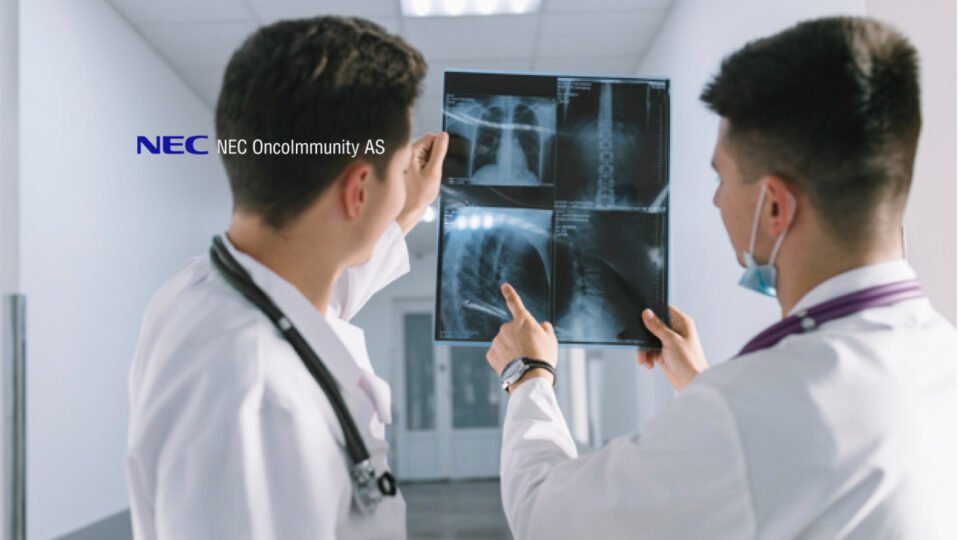NEC OncoImmunity AS (NOI), a subsidiary of NEC Corporation (NEC), and Oslo University Hospital (OUH) are pleased to announce that they have recently been awarded a prestigious grant from the Research Council of Norway (RCN) to develop an artificial intelligence (AI) platform that will enable the rapid design of T-cell diagnostics for emerging or endemic infectious diseases. The project will develop a novel T-cell diagnostic for the current COVID-19 pandemic to complement the current serological tests. This will improve the ability to identify immune responses and acquired immunity, which is desperately needed to deal with the COVID-19 crisis.
Current technologies involve extensive trial and error to define exactly which parts of the pathogen induces robust immunity. These so-called immunodominant epitopes need to be identified for the general population. These demanding, work-intensive and time-consuming steps are necessary to develop tests to monitor the T-cell response to viruses such as SARS-CoV-2 (the infectious virus that causes COVID-19).
Reliable diagnostic tests to identify immune individuals are critical to overcome the ever-looming threat of COVID-19. The AI-based diagnostic to be developed in this project will complement antibody tests and enable individuals who are naturally immune to the virus following infection with SARS-CoV-2 or other seasonal coronaviruses, or who have acquired immunity following vaccination, to be identified.
“Antibody tests are an important aspect of understanding the immune response to the SARS-CoV-2 infection and will remain a mainstay of its diagnosis. However, protective SARS-CoV-2-specific T-cell responses occur in antibody-negative infected individuals who have successfully resolved the infection. In addition, we may already have underlying immunity in the population due to cross reactivity to endemic seasonal human coronaviruses,” said Professor Ludvig A. Munthe Ph.D., Head of Research and Group Leader, Department of Immunology, Oslo University Hospital.
Although the technology to develop antibody diagnostics is readily available, this is not the case for T-cell diagnostics, which currently represents a “blind spot” for the monitoring of immunity to COVID-19 in the world’s population. To address this important gap, NOI and OUH, with the support of RCN, have now committed themselves to develop an AI-designed T-cell diagnostic that monitors the underlying T-cell response to the infection. Developing a reliable T-cell diagnostic comes with specific technological challenges with solutions offered by the NEC Immune Profiler at NOI to cater for the global human population.
“T-cells are known to play a central role for initial and long term immunity against viruses. However, T-cell responses are highly variable between different pathogens and genetic groups in the human population, making the prospect of developing reliable universal T-cell diagnostics for COVID-19 challenging. This challenge has inspired the scientists at NOI to use our AI to seek out the T-cell response to infection as a diagnostic signal. In this project we look forward to adapting the NEC Immune Profiler and other AI technologies at NEC Corporation and leveraging them to develop a COVID-19 T-cell diagnostic for the diverse genetic makeup in the global human population,” said Trevor Clancy Ph.D., Chief Scientific Officer, NEC OncoImmunity AS.
The development of such an AI platform will not only help to contact-trace and control transmission against COVID-19. In fact, the platform developed by NOI and NEC in this project will be to a large degree pathogen/disease agnostic and may be used in future emergency settings to rapidly develop novel diagnostics against new emerging pandemics caused by novel dangerous infectious agents.
“The AI platform will be applied first to the current COVID-19 pandemic. However, we will design this platform to be future-proof and make it applicable to any future emerging infectious agent that could threaten the global population. This will open up new exciting opportunities in the growing infectious disease diagnostics market for our company,” said Richard Stratford Ph.D., Chief Executive Officer, NEC OncoImmunity AS.
It has been over a century since the world has encountered a pandemic like COVID-19. The pandemic has taken over one million lives to date, and the spread of COVID-19 around the globe and the associated mortality has been devastating. The pandemic has sparked fears of a chronic worldwide recession. Shut-downs, social distancing and travel restrictions have reduced the capacity of the global workforce and destroyed many jobs and businesses. The NOI and OUH collaboration marks an important initiative to develop a reliable diagnostic test that can identify immune members of the global population following natural infection with SARS-CoV-2 or other seasonal coronaviruses.
“A reliable T-cell diagnostic to help alleviate the socio-economic and serious health burden caused by COVID-19 will be important for the world community to overcome this present pandemic crisis. We are proud that NEC’s AI technology can contribute to the resolution of the COVID-19 threat. As a company that seeks to enhance the well-being of society, NEC will continue to capitalize on research and development that maximizes the strengths of our AI technology to help prevent the spread of COVID-19, and protect the human population against future pandemic threats,” said Akira Kitamura, General Manager of the AI Drug Development Division, NEC Corporation.

